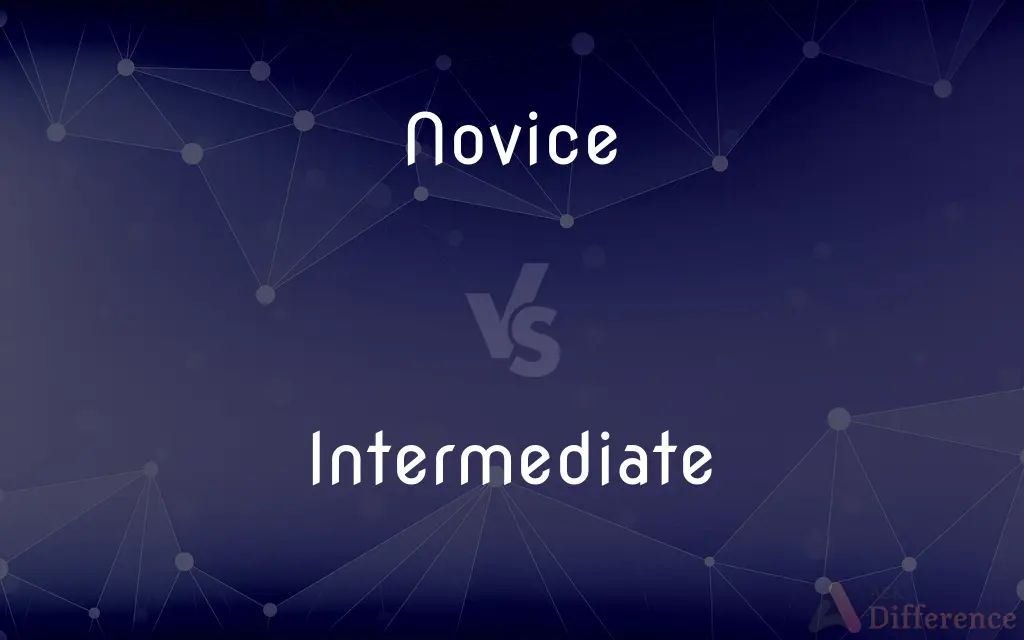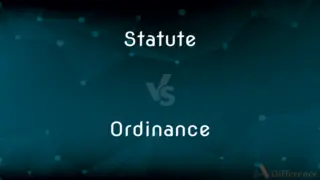Novice vs. Intermediate — What's the Difference?
By Tayyaba Rehman — Updated on October 27, 2023
A novice is a beginner with little experience; an intermediate has more skill but is not yet advanced.

Difference Between Novice and Intermediate
Table of Contents
ADVERTISEMENT
Key Differences
A novice, in various contexts, represents someone who is new to a particular field, skill, or activity. This individual typically lacks the experience and might be starting their journey in the learning process. Intermediate, on the other hand, denotes someone who has moved past the beginner stage and has acquired some level of proficiency, but is not yet an expert.
If we consider the progression of learning, a novice would be at the initial stages, possibly grappling with fundamental concepts or basic tasks. The intermediate stage signifies progression, where the individual has surpassed basic understanding and can handle more complex tasks, but still has more to learn to reach mastery.
In some domains, especially those that involve certifications or structured learning paths, such as languages or musical instruments, novice and intermediate can have specific benchmarks. A novice might be someone who knows basic vocabulary in a new language, while an intermediate might hold simple conversations but struggles with nuanced or technical discussions.
Using a sports analogy, a novice might be someone just learning the rules and basic techniques of a game. An intermediate player, while not a professional, would have played enough to develop strategies, understand game dynamics, and possess decent playing skills.
In essence, the journey from novice to intermediate is about growth, development, and increasing competency. While the novice stage is about foundational learning, the intermediate stage is about refining skills and broadening knowledge, preparing for advanced levels.
ADVERTISEMENT
Comparison Chart
Experience Level
Little to no experience
Some experience, but not advanced
Learning Stage
Beginning stages
Middle stages, between beginner and advanced
Proficiency
Basic
Moderate
Task Complexity
Simple tasks
More complex tasks, but not the most intricate
Depth of Knowledge
Foundational or fundamental
Deeper than basics, but not exhaustive
Compare with Definitions
Novice
A beginner or learner
Every expert was once a novice.
Intermediate
Being between two extremes in time, space, or state
The intermediate stages of the project were the most challenging.
Novice
Someone who has recently entered a religious order but hasn't taken vows
The novice spent years learning about the monastic life.
Intermediate
Serving as a means or agency; intervening
Intermediate steps in the process were crucial for success.
Novice
A person new to a field or activity
As a novice in cooking, he struggled to boil water.
Intermediate
Relating to a middle level in a hierarchy
He is an intermediate player, not a beginner but not an expert either.
Novice
Lacking experience in a specific endeavor
His novice attempts at painting were endearing.
Intermediate
Coming between two things in time, place, character, etc.
A cooled liquid intermediate between liquid and solid
An intermediate stage of development
Novice
A novice is a person who has entered a religious order and is under probation, before taking vows. By extension, the term is used informally for a person or animal new to a particular field of endeavour.
Intermediate
An intermediate thing.
Novice
A person new to and inexperienced in a job or situation
He was a complete novice in foreign affairs
Intermediate
Act as intermediary; mediate
Groups which intermediated between the individual and the state
Novice
A person who has entered a religious order and is under probation, before taking vows.
Intermediate
Lying or occurring between two extremes or in a middle position or state
An aircraft having an intermediate range.
An intermediate school.
Novice
A person new to a field or activity; a beginner.
Intermediate
One that is in a middle position or state.
Novice
A person who has entered a religious order but has not yet taken final vows. Also called novitiate.
Intermediate
An intermediary.
Novice
A beginner; one who is not very familiar or experienced in a particular subject.
I'm only a novice at coding, and my programs frequently have bugs that more experienced programmers would avoid.
Intermediate
(Chemistry) A substance formed as a necessary stage in the manufacture of a desired end product.
Novice
(religion) A new member of a religious order accepted on a conditional basis, prior to confirmation.
Intermediate
An automobile that is smaller than a full-sized model but larger than a compact.
Novice
One who is new in any business, profession, or calling; one unacquainted or unskilled; one yet in the rudiments; a beginner; a tyro.
I am young; a novice in the trade.
Intermediate
To act as an intermediary; mediate.
Novice
One newly received into the church, or one newly converted to the Christian faith.
Intermediate
To intervene.
Novice
One who enters a religious house, whether of monks or nuns, as a probationist.
No poore cloisterer, nor no novys.
Intermediate
Being between two extremes, or in the middle of a range.
Novice
Like a novice; becoming a novice.
Intermediate
Anything in an intermediate position.
Novice
Someone who has entered a religious order but has not taken final vows
Intermediate
An intermediary.
Novice
Someone new to a field or activity
Intermediate
(chemistry) Any substance formed as part of a series of chemical reactions that is not the end-product.
Novice
Someone inexperienced in a profession or situation
She felt like a novice amidst seasoned journalists.
Intermediate
(intransitive) To mediate, to be an intermediate.
Intermediate
(transitive) To arrange, in the manner of a broker.
Central banks need to regulate the entities that intermediate monetary transactions.
Intermediate
Lying or being in the middle place or degree, or between two extremes; coming or done between; intervening; interposed; interjacent; as, an intermediate space or time; intermediate colors.
Intermediate
Of or pertaining to an intermediate school; as, intermediate education.
Intermediate
To come between; to intervene; to interpose.
Intermediate
A person who intermediates between others, especially in negotiations; an intermediary; a mediator.
Intermediate
Something that is intermediate.
Intermediate
A compound which is produced in the course of a chemical synthesis, which is not itself the final product, but is used in further reactions which produce the final product; also called synthetic intermediate, intermediate compound or intermediate product; - contrasted to starting material and end product or final product. There may be many different intermediates between the starting material and end product in the course of a complex synthesis; as, many industrial chemicals are produced primarily to be used as intermediates in other syntheses.
Intermediate
A substance formed during a chemical process before the desired product is obtained
Intermediate
Act between parties with a view to reconciling differences;
He interceded in the family dispute
He mediated a settlement
Intermediate
Lying between two extremes in time or space or degree;
Going from sitting to standing without intermediate pushes with the hands
Intermediate stages in a process
Intermediate stops on the route
An intermediate level
The last time I saw Paris
The last day of the month
Had the last word
Waited until the last minute
He raised his voice in a last supreme call
The last game of the season
Down to his last nickel
Intermediate
Around the middle of a scale of evaluation of physical measures;
An orange of average size
Intermediate capacity
A plane with intermediate range
Medium bombers
Intermediate
Middle-tier in terms of skill or proficiency
She attended the intermediate guitar class.
Intermediate
Neither basic nor advanced
The software caters to both novice and intermediate users.
Common Curiosities
What comes before a novice?
Typically, a novice is the starting point, so there's nothing that comes before in terms of skill level.
Is there a clear boundary between novice and intermediate?
It varies by field; sometimes there are clear benchmarks, but often the transition is gradual.
How long does one stay a novice?
The duration varies based on individual progress and the complexity of the field or skill.
Can a novice teach another novice?
While they can share what they know, it's beneficial to learn foundational concepts from someone more experienced.
Can someone be an intermediate in one area but a novice in another?
Absolutely, proficiency varies by skill or subject area.
How does one move from novice to intermediate?
Through practice, experience, and further learning or training.
What's the benefit of reaching an intermediate level?
Greater competency, broader skill set, and increased confidence in the domain.
Is the intermediate level the same in all domains?
No, what's intermediate in one domain might be beginner or advanced in another.
Do all novices become intermediates?
Not necessarily; progression depends on effort, opportunities, and sometimes innate aptitude.
Is it okay to remain a novice?
It's a personal choice. Some enjoy dabbling in many things without mastering any, while others prefer depth in a few areas.
After reaching an intermediate level, what's next?
After intermediate, one typically progresses to an advanced level.
Can novice also refer to monks?
Yes, a novice can be someone who has entered a religious order but hasn't taken vows yet.
Is the journey from novice to intermediate linear?
No, learning often has peaks, plateaus, and troughs; progress isn't always linear.
Are there tests to determine if one is novice or intermediate?
In some fields, there are structured evaluations, but it's often based on demonstrable skills and knowledge.
Can one regress from intermediate back to novice?
If skills aren't maintained or used, proficiency can diminish over time.
Share Your Discovery

Previous Comparison
Schnapps vs. Brandy
Next Comparison
Statute vs. OrdinanceAuthor Spotlight
Written by
Tayyaba RehmanTayyaba Rehman is a distinguished writer, currently serving as a primary contributor to askdifference.com. As a researcher in semantics and etymology, Tayyaba's passion for the complexity of languages and their distinctions has found a perfect home on the platform. Tayyaba delves into the intricacies of language, distinguishing between commonly confused words and phrases, thereby providing clarity for readers worldwide.














































